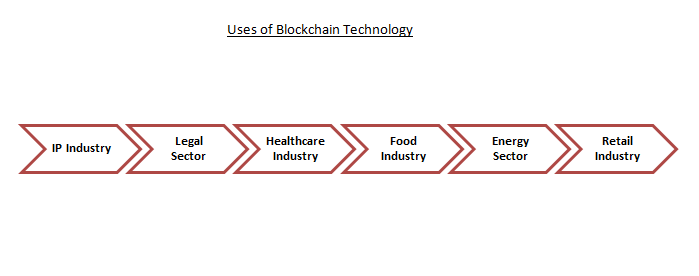A Short Beginner’s Guide to Blockchain Technology
With the advent of the digital era, there has been a rapid transformation of numerous industries and sectors. Blockchain is one digital technology that has heavily impacted some major industries and sectors, including healthcare, IP, retail, IT, and food. Furthermore, other industries and companies across the globe are fast adopting this technology owing to its security and immutability.
The following article discusses everything that you need to know about blockchain technology.
Table of Contents
What is Blockchain?
Blockchain is essentially a computerized record of exchanges that are copied as well as distributed over the entire organization of PC frameworks. Every square in the chain includes numerous exchanges, and every time an exchange takes place on the blockchain, a new record is added to the record of every member. The decentralized information base overseen by different members is called a Distributed Ledger Technology (DLT).
Uses of Blockchain Technology
Blockchain is a technology that can be deployed in a host of sectors and businesses, including:

- IP Industry
Various types of data can be added to a blockchain and a timestamp can help the creators or inventors in proving the type and time of creation. This is especially useful in courts or while registering their work. In essence, blockchain can offer solutions for securing IP as well as for managing digital rights.
- Legal Sector
Smart contracts that are stored on blockchain monitor contract parties, ownership transfers, terms, and delivery of goods/services sans legal intervention. A smart contract is in paper form while a smart contact is a small computer programmer. With the help of a smart contract, any two strangers can transfer their assets. There is no trust issue in a smart contract and no involvement of a third party since it is distributed in an open distributed ledger. Furthermore, there is no chance of loss or hacking of a smart contract. In order to better understand this concept, let us assume there are two individuals Mr. A and Mr. B. Mr. A has a patent and he has kept the information in a smart contract that is stored in blockchain. If Mr. A wants to sell his patent to Mr. B, he will have to instruct the smart contact to change ownership of the patent from Mr. A to Mr. B. Thereafter, miners will confirm whether Mr. A has the selling authority or not. If he does, then the smart contact will update this information in the global distributed ledger.
- Healthcare Industry
In the healthcare domain, medical records in electronic form are stored in blockchain and retrieved and made up to date using biometrics. This enables the democratization of the data of patients and helps in reducing the burden of transferring records between providers.
- Government
As a digital technology, blockchain offers the promise to save information about a person’s identity, his/her criminal record as well as e-citizenship that are authorized by biometrics. It provides secure storage of government, citizen, and business data while also reducing the labor-intensive process.
- Food Industry
The use of blockchain to record food supply chain data provides increased traceability of product origin, processing, batching, expiry, the temperature of storage as well as shipping. It provides a secure and immutable platform where data can be stored and accessed by every participant.
- Energy Sector
Decentralized energy transfer and dissemination is possible through microtransactions of data that is sent to the blockchain, authenticated, and redistributed to the grid while ensuring payment to the submitter. This helps in reducing energy bill costs and provides affordable energy to all communities.
- Retail Industry
Retail Blockchain is a term used for disruptive technology for recording digital transactions on a distributed ledger in the sector. Secure peer-to-peer (P2P) marketplaces can track P2P retail transactions with product information, shipment, bills of lading input on blockchain, and complete payment via bitcoins.
Bitcoin System vs. Current Banking System
- Decentralized System
As compared to banks and financial organizations that are governed by Central or Federal authorities, the blockchain system follows a decentralized approach. This means there is a transfer of decision-making power and control from a centralized entity to a network. Thus, every individual who is a part of this system holds some power.
- Public Ledgers
The record which holds the subtleties of all exchanges that occur on blockchain is open and available to every individual who is related to the framework. Even though the total record is freely available, the subtleties of individuals associated with the exchanges remain anonymous.
- Verification of Transactions
Every exchange is confirmed by cross-checking the ledger and the approval sign of exchange is sent after a couple of moments. Using a few complex encryptions and hashing calculations, the issue of two-fold spending is eliminated. Essentially, whenever a transaction is made, it is broadcasted to the whole network. Thereafter, miners select some transactions, validate them, and put them into a block.
- Low or No Transaction Fees
Transaction charges in blockchain are low when contrasted with the expenses suggested by banks and other budgetary associations. If an exchange has to be completed on need, an extra exchange expense can be included by the client to have the exchange checked.
Conclusion
Today, digital technologies are rapidly transforming various industries and sectors. Among these technologies, blockchain finds applications in some prominent industries owing to its numerous benefits such as cost-effectiveness, enhanced privacy, and better operational efficiency. The demand for blockchain technology is expected to grow even further in the future.
– Aman Kumar, Chandan Singh, Sujeet Kr Singh (Innovation and Technology) and the Editorial Team




